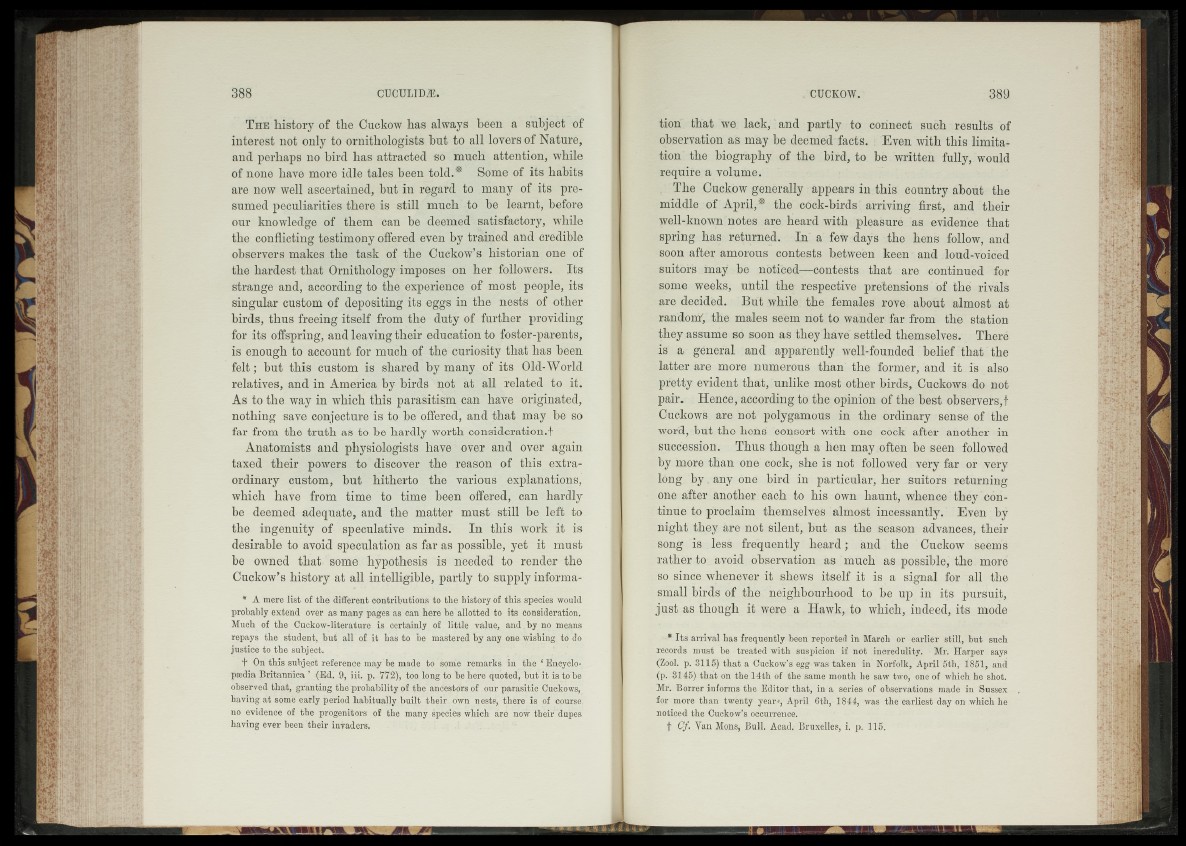
T h e history of the Cuckow has always been a subject of
interest not only to ornithologists but to all lovers of Nature,
and perhaps no bird has attracted «0 much attention, while
of none have more idle tales been told.* Some of its habits
are now well ascertained, but in regard to many of its presumed
peculiarities there is still much to be learnt, before
our knowledge of them can be deemed satisfactory, while
the conflicting testimony offered even by trained and credible
observers makes the task of the Cuckow’s historian one of
the hardest that Ornithology imposes on her followers. Its
strange and, according to the experience of most people, its
singular custom of depositing its eggs in the nests of other
birds, thus freeing itself from the duty of further providing
for its offspring, and leaving their education to foster-parents,
is enough to account for much of the curiosity that has been
felt; but this custom is shared by many of its Old-World
relatives, and in America by birds not at all related to it.
As to the way in which this parasitism can have originated,
nothing save conjecture is to be offered, and that may be so
far from the truth as to be hardly worth consideration.f
Anatomists and physiologists have over and over again
taxed their powers to discover the reason of this extraordinary
custom, but hitherto the various explanations,
which have from time to time been offered, can hardly
be deemed adequate, and the matter must still be left to
the ingenuity of speculative minds. In this wrork it is
desirable to avoid speculation as far as possible, yet it must
be owned that some hypothesis is needed to render the
Cuckow’s history at all intelligible, partly to supply informa-
* A mere list of the different contributions to the history of this species would
probably extend over as many pages as can here be allotted to its consideration.
Much of the Cuckow-literature is certainly of little value, and by no means
repays the student, but all of it has to be mastered by any one wishing to do
justice to the subject.
+ On this subject reference may be made to some remarks in the ‘ Encyclopaedia
Britanriica ’ -(Ed. 9, iii. p. 772), too long to be here quoted, but it is t.obe
observed that, granting the probability of the ancestors of our parasitic Cuckows,
having at some early period habitually built their own nests, there is of course-
no evidence of the progenitors of the many species which are now their dupes
having ever been their invaders.
tion that we lack,'and partly to connect such results of
observation as may be deemed facts. | Even with this limitation
the biography of the bird, to be written fully, would
require a volume.
The Cuckow generally appears in this country about the
middle of April,* the cock-birds arriving first, and their
well-knov:n notes are heard with pleasure as evidence that
spring has returned. In a few days the hens follow, and
soon after amorous contests between keen and loud-voiced
suitors may be noticed—contests that are continued for
some weeks, until the respective pretensions of the rivals
are decided. But while the females rove about almost at
random', the males seem not to wander far from the station
they assume so soon as they have settled themselves. There
is a general and apparently well-founded belief that the
latter are more numerous than the former, and it is also
pretty evident that, unlike most other birds, Cuckows do not
pair. Hence, according to the opinion of the best observers,!
Cuckows are not polygamous in the ordinary sense of the
word, but the hens consort with one cock after another in
succession. Thus though a hen may .often be seen followed
by more than one cock, she is not followed very far or very
long by. any one bird in particular, her suitors returning
one after another each to his own haunt, whence they continue
to proclaim themselves almost incessantly.' Even by
night they are not silent, but as the season advances, their
song is less frequently heard; and the Cuckow seems
rather to avoid observation as much as possible, the more
so since whenever it shews itself it is a signal for all the
small birds of the neighbourhood to be up in its pursuit,
just as though it were a Hawk, to which, indeed, its mode
* Its arrival has frequently been reported in March or earlier still, hut such
records must he treated with suspicion if not incredulity. Mr. Harper says
(Zool. p. 3115) that a Cuckow's egg was taken in Norfolk, April 5th, 1851, and
(p.. 3145) that on the 14th of the same month he saw two, one of which he shot.
Mr. Borrer informs the Editor that, in a series of observations made in Sussex
for more than twenty years, April 6th, 1844, was the earliest day on which he
noticed the Cuckow’s occurrence.
f Cf. Van Mons, Bull. Acad. Bruxelles, i. p. 115.